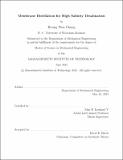Membrane distillation for high salinity desalination
Author(s)
Chung, Hyung Won
DownloadFull printable version (26.57Mb)
Alternative title
MD for high salinity desalination
Other Contributors
Massachusetts Institute of Technology. Department of Mechanical Engineering.
Advisor
John H. Lienhard, V.
Terms of use
Metadata
Show full item recordAbstract
Membrane distillation systems typically have low energy efficiency. Multistage membrane distillation (MD) systems can have significantly higher efficiencies than their single stage counterparts. However, multistage MD system design has received limited attention. In this work, the performance of a multistage vacuum membrane distillation (MSVMD) which is thermodynamically similar to a multi-stage flash distillation (MSF) is evaluated for desalination, brine concentration, and produced water reclamation applications. A wide range of solution concentrations were accurately modeled by implementing Pitzer's equations for NaCl-solution properties. The viability of MSVMD use for zero liquid discharge (ZLD) applications is investigated, by considering discharge salinities close to NaCl saturation conditions. Energy efficiency (gained output ratio or GOR), second law efficiency, and the specific membrane area were used to quantify the performance of the system. At high salinities, the increased boiling point elevation of the feed stream resulted in lower fluxes, larger heating requirements and lower GOR values. The second law efficiency, however, is higher under these conditions since the least heat for separation increases faster than the system's specific energy consumption with increase in salinity. Under high salinity conditions, the relative significance of irreversible losses is lower. Results indicate that MSVMD systems can be as efficient as a conventional MSF system, while using reasonable membrane areas and for a wide range of feed salinities. Given MD's advantages over MSF such as lower capital requirement and scalability, MSVMD can be an attractive alternative to conventional thermal desalination systems. Recently proposed single stage MD systems have shown high energy efficiency. Permeate gap (PGMD) and conductive gap (CGMD) systems are studied in the context of energy efficiency. A wide range of salinities was considered to investigate potential of these single stage systems for high salinity desalination applications.
Description
Thesis: S.M., Massachusetts Institute of Technology, Department of Mechanical Engineering, 2015. This electronic version was submitted by the student author. The certified thesis is available in the Institute Archives and Special Collections. Cataloged from student-submitted PDF version of thesis. Includes bibliographical references (pages 57-60).
Date issued
2015Department
Massachusetts Institute of Technology. Department of Mechanical EngineeringPublisher
Massachusetts Institute of Technology
Keywords
Mechanical Engineering.